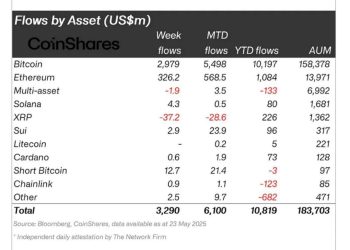The changes to the scaling roadmap would introduce “partially stateless nodes” to make running a personal node easier.
Ethereum co-founder Vitalik Buterin has proposed changes to the Ethereum scaling roadmap that could make it easier for people to use the network in a more private and censorship-resistant way.
Published on Monday, May 19, Buterin’s post details adjustments to Ethereum’s Layer-1 (L1) scaling roadmap to make it more accessible for regular users who want to run their own local nodes. Buterin argues that the changes are necessary as “it’s valuable to have a full node so that you can have a local RPC server that you can use to read the chain in a trustless, censorship-resistant and privacy-friendly way.”
Specifically, the proposal introduces the concept of “partially stateless nodes” – a new type of node that can verify Ethereum blocks without needing to store the full blockchain history.
“The node is capable of responding to RPC requests as long as the required data is within that subset of the state” the proposal reads. “Other requests will fail (or have to fallback to an externally-hosted cryptographic solution; whether or not to do this should be the user’s choice).”
RPC, or Remote Procedure Call, is a communication protocol that allows one program to request a task or service from another program, typically running on a different computer or server.
Buterin also emphasized in the post that relying too heavily on a few RPC providers increases censorship risks. “A market structure dominated by a few RPC providers is one that will face strong pressure to deplatform or censor users,” Buterin writes. “Many RPC providers already exclude entire countries.”
This new proposal for the scaling roadmap comes around one month after Buterin shared his ideas for a roadmap that aims to simplify Ethereum’s user privacy without disrupting consensus changes. That roadmap had four primary focuses: Privacy of on-chain payments, partial anonymization of on-chain activity inside applications, privacy of reads to the chain, and network-level anonymization.
Most recently, Ethereum launched its Pectra update – a bundle of 11 major code changes, known as Ethereum Improvement Proposals, or EIPs. Three of the EIPs included in Pectra focus on improving the user experience of validators, while others tackle blob scaling.
Since the Pectra upgrade went live, ETH has surged in price and is currently trading near $2,500, up 40% over the past two weeks, and over 57% over the past month, according to CoinGecko.

#Vitalik #Buterin #Proposes #Type #Node #Ethereum




















